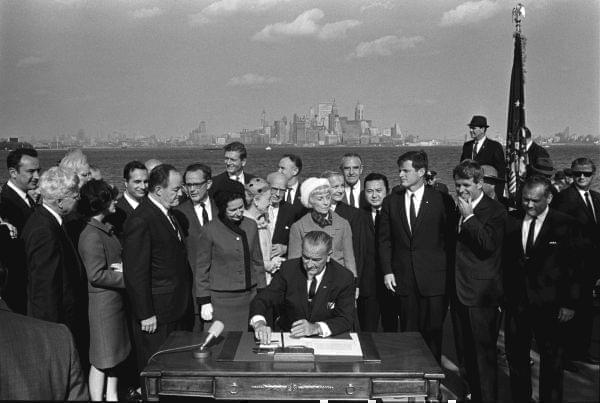Tom Gjelten: U.S. Moving Toward ‘Nation of Nations’

President Lyndon B. Johnson signs the 1965 Immigration and Nationality Act as Vice President Hubert Humphrey, Lady Bird Johnson, Muriel Humphrey, Sen. Edward (Ted) Kennedy, Sen. Robert F. Kennedy, and others look on. Public Domain
It’s been fifty years since our current immigration law, the 1965 Immigration and Nationality Act, was signed by President Johnson on Ellis Island and in that time the United States has begun to resemble the “Nation of Nations” that Walt Whitman described 160 years ago in his poem “Leaves of Grass.”
The color, the complexion of America has changed. The color of the immigrant population has changed.Tom Gjelten
NPR’s Tom Gjelten talked with Illinois Public Media’s Amanda Honigfort about how his new book, Nation of Nations: A Great American Immigration Story, chronicles not only how we’ve reached that point, but also tells the stories of some of those immigrants.
"I found it fascinating to go back and read testimony from debates in the nineteenth century where you had some legislators saying outlandish things about people from other colors and nationalities and also you had people making a strong defense of America as a place that should not be characterized by prejudice," said Gjelten. "It's interesting that the debates we've been having over and over go back that far."

Tom Gjelten
Until the 1965 Immigration and Nationality Act was passed, United States immigration law was dominated by the quota system in which a certain number of people, and only that number of people, from each country could immigrate to the U.S. each year. Anglo-Saxon countries were awarded high quotas while every other country were assigned low quotas.
When the quota system was abolished in 1965, proponents of the system put forward a new idea - immigrants should not only be chosen on their merits but also with a priority for family unity. This way, they figured, new Anglo-Saxon immigrants would come to join the existing Anglo-Saxon immigrants.
It worked "for the first few years, but as immigrants from other national backgrounds got a foothold in this country they were the ones who were most motivated to bring in relatives. They were the ones coming from regions where there was the strongest push," said Gjelten. "I think that's one of the most ironic aspects of that law."
“You can’t any longer restrict the idea of Americanism, if there is such a word, in the way that we could in the past we have to come up with an idea of America, come up with an idea of becoming an American that allows for people of non-traditional backgrounds,” said Gjelten.
You have to think deeply and thoughtfully and carefully about the challenge of integrating a diverse society. It’s not an automatic thing. It’s a challenging thing. Tom Gjelten
Gjelten says that he doesn't mean to understate the challenges of immigration for the immigrants and the country they adopt but he believes that “by and large I think it’s been an experience that has shown that America does have the capacity to incorporate people of different backgrounds.”
He says that in response he’s seeing more of an emphasis on “political ideology.” In other words, “The American identity being tied up with principles of the U.S. Constitution, individual rights, the ideas inherent in the Declaration of Independence – more of a civic understanding of the American identity as opposed to a culture or even religious identity.”
"You're going to find immigrants who don't integrate successfully, harmoniously into this society, but you are going to find just as many and many times more immigrants from diverse backgrounds who become true genuine heroic Americans,” said Gjelten.

